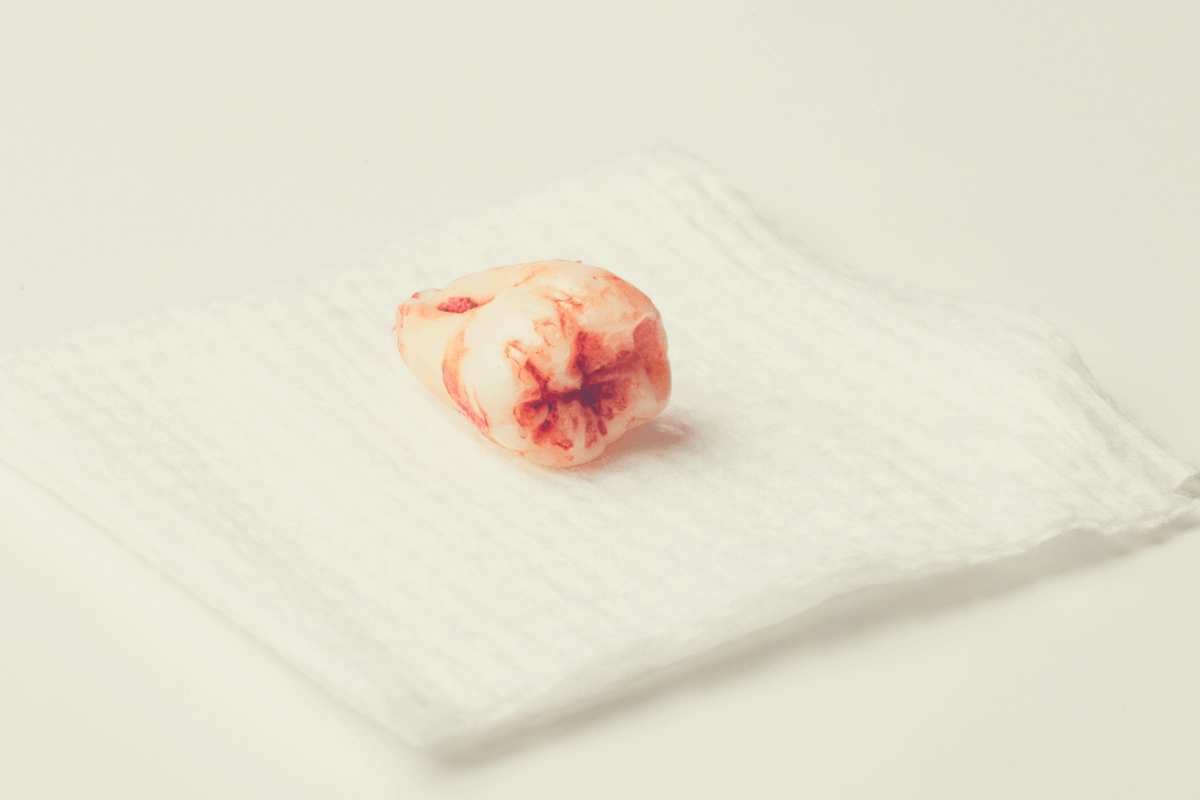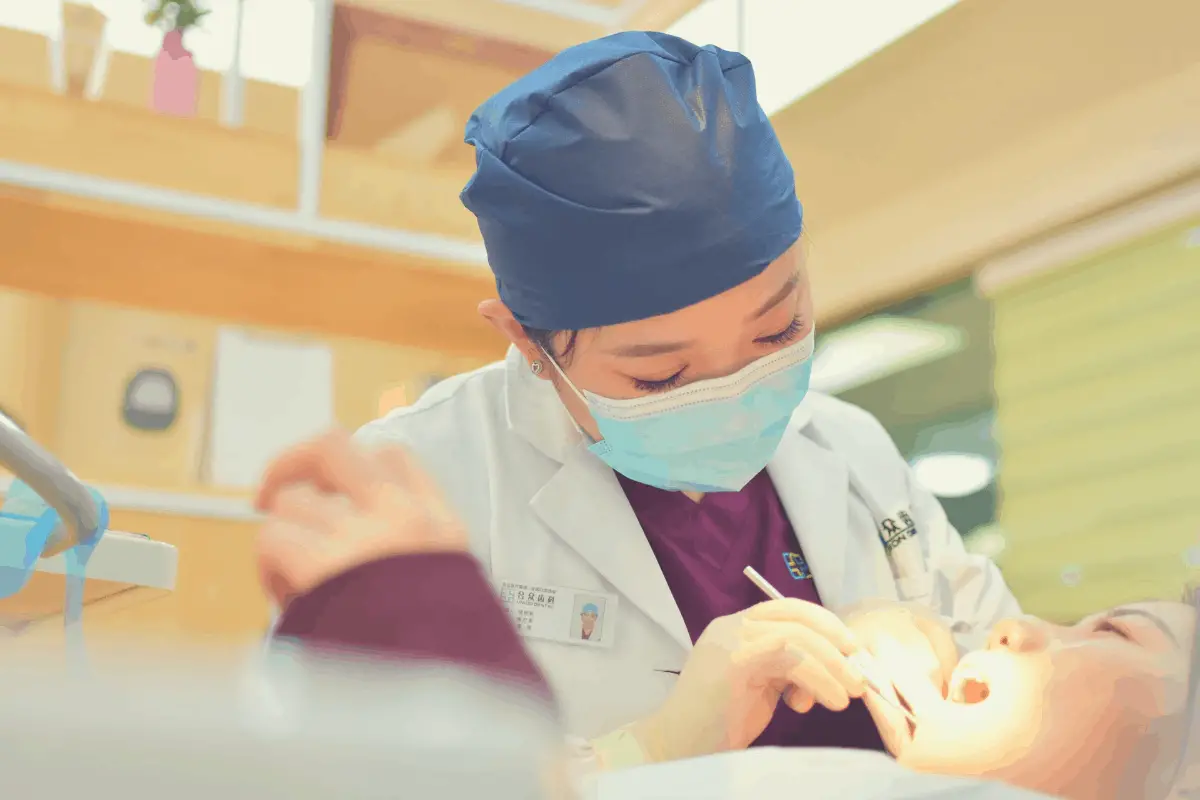Are you scheduled for wisdom tooth extraction or do you need to have one or more teeth removed for any reason? If the answer is yes, you’re right to be wondering whether the procedure is safe and how to minimize its impact on your well-being the first few weeks after.
One of the most common questions patients or would-be patients ask is whether they can sleep with the gauze in their mouths.
Can you sleep with gauze in the mouth after tooth extraction? The answer is absolutely no. Sleeping with a gauze overnight should be out of the question. Take off the gauze after a maximum of 4 hours when the bleeding from the surgery wounds should have completely ceased.
When is Sleeping with a Dental Gauze Permissible?
There are situations when a dentist may allow the patient to sleep with a dental gauze in the mouth. This may be permissible for patients experiencing side effects such as drowsiness after teeth extraction.
But what can cause drowsiness after wisdom teeth removal in the first place? Well, the majority of dentists use oxygen and nitrous oxide, popularly known as laughing gas during the procedure to numb the patient’s pain as the teeth are removed.
This anesthesia is usually administered through the nose via a mask and allows patients to stay wide awake during the procedure.
However, some patients may have to be heavily sedated with stronger medications to enhance the success of the procedure. Here are other anesthesia options that may be used during tooth extraction surgery.
Intravenous Fentanyl, Versed or Ketamine Anesthesia
Do you have a history of extreme anxiety during even the simplest dental or medical procedures? If yes, Laughing Gas may not be an option during tooth extraction surgery.
Instead, the dentist may choose stronger intravenous drugs such as Fentanyl, Versed, or Ketamine. These medications medically known as General Anesthesia may put the patient to sleep throughout the entire teeth extraction process and a couple of hours after, to ensure a higher chance of success.
The difference is that while teeth removal is usually done at the Dentist’s office, patients are typically taken to a hospital when General Anesthesia is involved. This is because the anesthesia is administered by Anesthesiologists, who are doctors specialized in that field of medicine.
Besides, patients with complicated cardiovascular diseases or lung conditions may be put to sleep with this option.
With the patient still sedated immediately after the procedure, the dentist may have no option but to allow sleeping with the dental gauze in the mouth.
Local Anesthesia
While the use of General Anesthesia is quite uncommon, dentists frequently recommend local anesthesia during wisdom teeth removal and other fairly simple procedures.
The most popular medications used in local anesthesia include lidocaine, bupivacaine, and mepivacaine. Sure, patients stay awake through the entire teeth extraction process when sedated with local anesthesia.
However, common side effects include drowsiness which may require the patient to nap for a couple of hours after the surgery.
Do Sedated Patients Sleep With Dental Gauze After Tooth Removal?
After reading the circumstances under which patients are sedated during teeth removal, you might wonder whether they’re allowed to sleep while wearing a gauze.
Are sedated patients allowed to sleep with a dental gauze in their mouths? The answer is yes. Since a gauze applies direct pressure to the wound site, dentists may have no option but to fit a gauze after the procedure even if the patient is not yet awake.
However, there should be somebody monitoring the patient at all times and waking him or her up every 20 minutes or so. Here are a few reasons why it is not advisable to allow a patient with a gauze to sleep unhinged no matter how sedated he or she may be:
Frequent changing of the gauze: A dental gauze applies direct pressure to the injury site to promote blood clotting as stated earlier. This means they’re likely to mix with a lot of blood especially the first hour or so after the procedure. Removing and replacing the gauze every 20-30 minutes can be crucial and this is why somebody needs to be arousing the patient at those intervals.
Monitor the bleeding: The bleeding from tooth removal surgery can be substantial but it gets better over time as the patient’s blood continues forming clots. Waking the patient up 2-3 times every hour does not only allow changing of the gauze but also provides first-hand monitoring of the situation. If the bleeding does not show signs of improvement within 1-2 hours then the dentist can be alerted for further action to be taken.
Prevents Oversleeping: Allowing patients to sleep uninterrupted with gauze in the mouth can increase the chances of getting into the REM sleep phase where he or she may lose complete consciousness of the surroundings.
This can lead to accidental aggravation of the surgical site, increasing the probability of disintegrating the dentist’s sutures.
Why is Sleeping With a Gauze in the Mouth a Bad Idea?
Dentists and oral health professionals frown on sleeping with gauze in the mouth. This is because the practice can carry risks that may put the patient’s life and well-being in danger. Shall we take a look at a few reasons why going to bed with a dental gauze in the mouth is a big no-no?
1. Slipping Out Accidentally
If you frequently open the mouth to breathe during sleep then there’s always a chance of the gauze slipping out. This can interfere with the blood clotting process especially when the patient does not realize it until the morning.
This may lead to excessive bleeding and its resultant effects.
2. Choking
Dental gauzes can be a choking hazard for patients who accidentally fall asleep with one in the mouth. Sure, this might seem impossible during the early stages of sleep when most patients are aware of their surroundings.
However, as the sleep gets deeper and deeper, patients become less conscious of their environment. This can lead to accidental swallowing of the gauze which may result in choking.
People of all ages have lost their lives or suffered significant complications from choking so this should not be taken lightly.
3. Accidental Swallowing
It is no secret that a dental gauze is not digestible even if you manage to swallow one without problems. However, its presence can lead to internal pain and discomfort which may require being rushed to the ER.
Sure, some patients may not experience any visible problems after swallowing the gauze but the knowledge that it is in your stomach alone can result in heightened anxiety. This can lead to sleeping difficulties which may interfere with the recovery process.
You may only be able to get rid of it through bowel movements after a few days which can be stressful. Ingesting fluids as much as possible may come in handy to speed up the exit of the gauze from the body.
If you’re in doubt, just call your dentist immediately for reassurance.
4. Biting Down the Gauze Too Hard
Dentists advise patients to bite down on the gauze gently after the teeth removal process. This applies direct but gentle pressure on the surgery site to promote blood clotting and easing of the bleeding.
If you suffer from Teeth Grinding at night, sleeping with a dental gauze can cause excessive biting which may lead to aggravation of the pain and discomfort. Besides, biting too hard on the surgery site can disintegrate the sutures.
This may worsen the bleeding and make it harder to eat or sleep.
5. No Idea the Extent of Bleeding

One of the benefits of changing the gauze every 20-30 minutes is that it allows the extent of the bleeding to be monitored. Sleeping uninterrupted with the gauze can automatically eliminate this monitoring ability.
In most cases, patients call their dentists immediately they suspect blood clotting deficiencies. However, sleeping with the gauze can leave you uninformed which may result in the loss of significant amounts of blood.
6. Increased Swelling
Wisdom tooth extraction surgery typically results in severe bruising and swelling. Hence, making sure that the affected site stays as elevated as possible can be a great idea.
An elevated position can allow the optimum supply of oxygen, food nutrients, and blood to the surgery site to enhance healing.
Sleeping with gauze in the mouth can interfere with the healing process by increasing the swelling. This may cause more discomfort which can affect various aspects of your life as well.
7. Dry Socket
Dry Socket is a painful medical condition that can result from leaving gauze in the mouth for extended periods. Remember, the main benefit of a dental gauze is to help in the formation of blood clots.
However, leaving the gauze on for more than 30 minutes can lead to the blood clots forming on it. When the gauze is eventually removed, it may lead to the dislodgement of the formed clots which can be extremely painful.
Since healing occurs after the clot formation, dry sockets can also delay the recovery process after wisdom tooth removal.
How do you Sleep Comfortably After Tooth Extraction Surgery?
Sleep may be hard to come by after undergoing wisdom tooth extraction surgery. This is why it is important to take active steps that can offer you the chance to get a good night of rest. A few smart ways to get some shuteye after the procedure may include:
1. Cold Packs
Placing a cold pack against the affected jaw can be lifesaving for patients in significant levels of pain. As previously stated, bruising may be inevitable after getting wisdom teeth removed so it is important to seek ways to reduce the pain.
Cold packs can numb the discomfort from the surgery site which should boost the ability to sleep. During the first 24 hours after the procedure, icing the bruised jaw for 15 minutes every hour can be crucial to pain relief.
This can be especially critical in the evening, 3-4 hours before your regular bedtime.
2. Take Prescribed Pain Medication

Depending on the extent of bruising and the patient’s pain tolerance levels, dentists may prescribe narcotic pain medications or over the counter options. These medications can be effective in inhibiting the sending of pain signals to the brain.
This can provide soothing relief that may help in the ability to get some shuteye during recovery from wisdom teeth removal.
Regardless of the extent of the pain, you should never take a higher dosage than prescribed by the dentist. Unless you’d prefer getting exposed to dangerous side effects that may affect your recovery and jeopardize the ability to fall asleep.
3. Sleep Elevated
Dentists recommend lying down in a position that ensures that the head is elevated above the heart at least during the first 24 hours after the surgery. This can help reduce the swelling while enhancing the formation of blood clots.
Sleeping in an elevated position can simply speed up the healing process and should be a no-brainer after getting wisdom teeth removed.
4. Eat The Right Foods
Attempting to consume regular solid foods after tooth extraction surgery can lead to excruciating pain. Does this mean sleeping on an empty stomach until the wound heals? The answer is no because getting the right nutrition can be an essential part of the healing process.
Thus, it is important to eat liquid-based diets for the first week after the procedure. A couple of healthy options that can come in handy may include:
- Milk
- Greek yogurt
- Natural Juices
- Porridge
- Protein Shakes
- Mashed Potatoes
- Banana Ice cream
During the second week, when patients typically experience signs of progress, mushy foods can be added to the mix. A few of the popular options may include:
- Mashed bananas
- Applesauce
- Broth
- Spaghetti
- Scrambled eggs
- Avocado
- Hummus
5. Get Enough Sleep
Long sleep is essential for healing from any type of wound or surgery and wisdom teeth removal is no exception. Even if you traditionally spend only 6-7 hours in bed per night, the first 1-2 weeks after the procedure is when you ramp up your sleep.
You should aim for at least 10 hours of shuteye within 24 hours. If getting that amount of rest at once proves difficult, late-morning or afternoon naps can be used to supplement the amount of rest gained at night.
Getting maximum nighttime rest can boost cell regeneration in the surgery site and get you back to normal functioning after 2 weeks.
6. Block Out The Noise
Excessive noise can rob anyone of the ability to sleep at night. Catching some Zzz after wisdom tooth surgery can be complicated enough even in whisper-quiet bedroom settings.
So can you imagine how much sleep disturbance loud noises may cause? Even patients with no history of insomnia may find themselves tossing and turning for hours throughout the night.
This is why it is important to block all background noises that may interfere with sleep. This may include:
- Switching off TVs, radios, and electronic gadgets
- Closing windows to block out background noises for city-center apartment residents
- Listening to white noise
- Wearing earbuds
- Wearing noise-canceling headphones
7. Put your Smartphone Down

Smartphones, iPads, and laptops can be a major source of sleep disturbance at bedtime. If you’ve just had wisdom tooth removal surgery, keeping these gadgets on at night can be a big mistake.
This is because they emit blue light that the brain may misinterpret as a sign that it is still daytime. This can lead to the release of stress hormones such as Cortisol renowned for keeping the mind alert and awake during the day.
Thus, falling and staying asleep can become much difficult when you spend time on these gadgets at night.
Conclusion
Sleeping with a dental gauze in the mouth after tooth extraction can lead to negative side effects including choking and possible aggravation of the injury. This is why dentists warn against that practice at all costs.
If you need to sleep with a gauze due to serious sedation from the anesthesia used in the surgery, there must be a third party that monitors and arouses you every 20-30 minutes.
This may be a dental nurse or loved one committed to changing the gauze as and when necessary.
